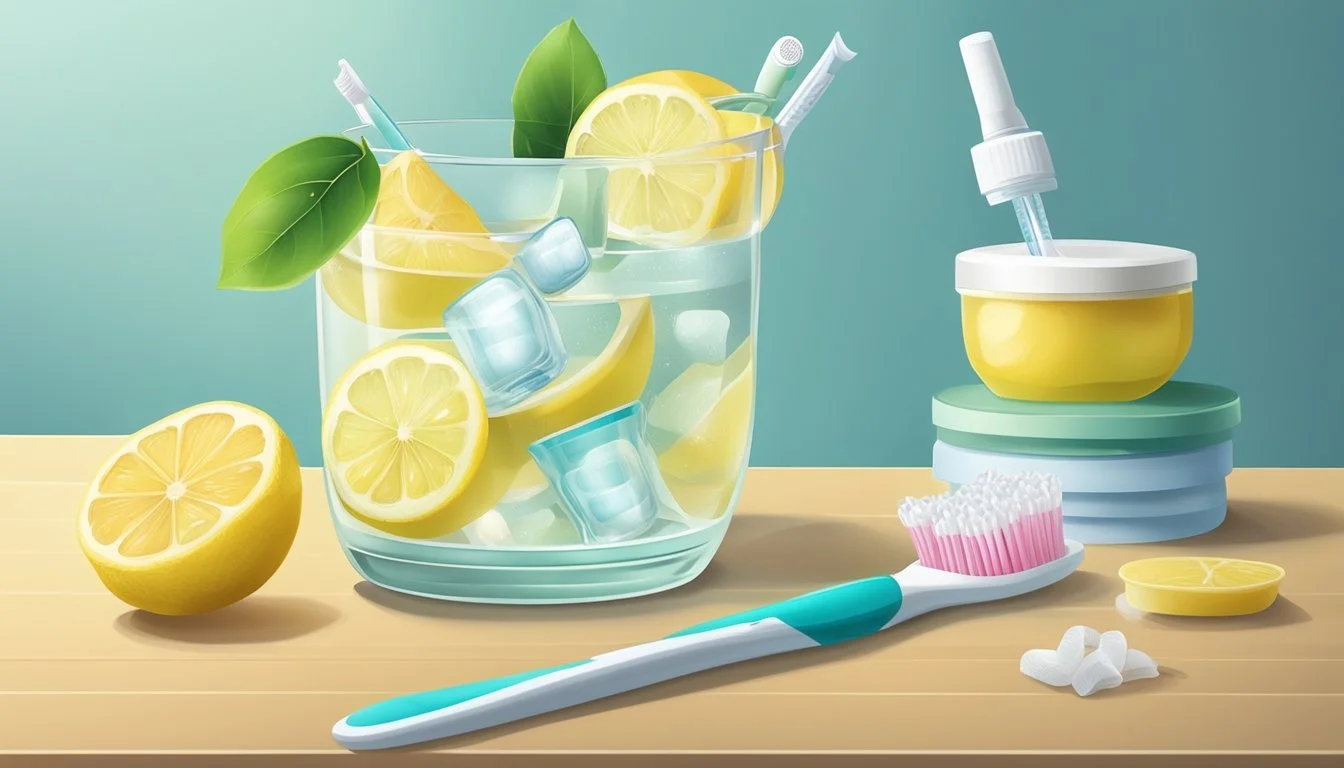The Truth About the Benefits of Drinking Lemon Water
Separating Facts from Myths
Drinking lemon water is a simple health habit popularized by its purported benefits. On one hand, it's known that staying hydrated is crucial for overall health, and this can include drinking water with a bit of lemon juice. Lemons, being a rich source of vitamin C and other antioxidants, have their own set of health advantages. The combination of both aims to provide a synergy of wellness effects.
However, when separating fact from wellness fads, it's essential to examine the science behind the claims. While lemons provide nutrients such as vitamin C, potassium, and vitamin B6, and have some antioxidant properties, the translation of these benefits to lemon-infused water is not always straightforward. Scientific research, rather than anecdotes, serves as the benchmark for validating health claims.
The efficacy of lemon water as a health-enhancing drink pertains to its ingredients' inherent properties. It is understood that drinking adequate fluids supports hydration, digestion, and kidney health. Nonetheless, the extent to which adding lemon to water contributes additional benefits is a topic of ongoing discussion and research within the nutrition science community.
Nutritional Profile of Lemon Water
Lemon water combines the nutritional benefits of lemon juice with the hydration provided by water. Its key components include vitamin C, antioxidants, and essential minerals that contribute to its health-promoting properties.
Vitamin C and Antioxidants
Lemon juice is a rich source of vitamin C, an essential nutrient that plays a pivotal role in immune system support and collagen synthesis. As an antioxidant, vitamin C helps combat oxidative stress by neutralizing free radicals in the body. A single lemon can provide about 18.6 milligrams of vitamin C, which is approximately 20% of the recommended daily value.
Mineral Content: Potassium and Calcium
Lemon water also delivers essential minerals, notably potassium and calcium. Potassium is crucial for normal cell function, including heart rhythm regulation and nerve transmission. Meanwhile, calcium is vital for bone health and proper muscle function. The minerals derived from lemon juice complement the nutrients found in water, enhancing the drink's overall nutrient profile.
Nutrients in Lemon Water:
Vitamin C: ≈ 18.6 mg per lemon
Potassium: Minimal contribution
Calcium: Minimal contribution
Citric Acid: Acts as a natural preservative; enhances metabolic energy processes
In summary, lemon water is more than just flavored water; it's a low-calorie beverage enriched with vitamin C and other beneficial elements such as antioxidants and minerals like potassium and calcium.
Hydration and Body Fluid Balance
Lemon water is often touted for its supposed health benefits, one of which is enhanced hydration. Understanding how it compares to plain water and its actual effects on hydration levels is critical.
Comparison with Plain Water
Plain water is a benchmark for hydration, essential for maintaining body fluid balance. It is recommended that individuals consume adequate amounts of water to stay hydrated. Lemon water is essentially plain water infused with lemon juice, which means it provides the same hydrating benefits but with additional nutrients like vitamin C, potassium, and other electrolytes. These nutrients do not improve the hydrating power of the water but can contribute to overall nutritional intake.
Plain Water: Crucial for hydration, no added nutrients
Lemon Water: Same hydration benefits as plain water with added nutrients
Effects on Hydration Levels
Staying hydrated is vital for health, and both plain water and lemon water can help maintain proper hydration levels. However, the presence of additional flavor in lemon water might encourage some people to drink more fluids than they would if only plain water were available. It's also worth noting that while the addition of lemon to water doesn't improve the body's ability to hydrate, it does contribute some minerals that are important for maintaining electrolyte balance.
Drinking lemon water might subtly promote increased water intake due to flavor.
Lemon water provides a source of minerals beneficial for electrolyte balance, yet does not increase actual hydration over plain water.
Weight Management and Metabolic Impact
Lemon water is often associated with weight management and has been considered to influence metabolism. However, the actual impact on weight loss and metabolic rate requires a closer examination of the evidence and physiological mechanisms at play.
Lemon Water and Weight Loss
Lemon water carries few calories, making it an attractive replacement for higher-calorie beverages. This simple substitution can contribute to a daily caloric deficit, which is fundamental for weight loss. Some studies suggest that the increase in water consumption can enhance satiety and reduce the overall caloric intake. Additionally, routine hydration has been positively linked to increased metabolic rate, although the effect of lemon specifically in this context is less clear.
Caloric Impact: Replacing sugary drinks with lemon water can reduce total calorie ingestion.
Satiety: Drinking water, including lemon water, before meals may increase feelings of fullness, leading to reduced caloric intake.
Influence on Metabolism and Fat
The impact of lemon water on metabolism and the burning of belly fat is often overstated. While staying hydrated is crucial for a functioning metabolism, the specific contribution of lemon water to accelerated fat loss is not strongly supported by scientific evidence. The body's metabolic processes are complex and can be affected by numerous factors including diet, exercise, and genetic predisposition.
Metabolic Rate: Hydration can support metabolic function, but the metabolism-boosting effects of lemon water specifically require more research.
Fat Reduction: There is no direct correlation between lemon water consumption and targeted fat loss such as belly fat.
In summary, lemon water may play a role in weight management through caloric reduction and potential appetite suppression. Still, it should not be relied upon as a singular solution for weight loss or metabolic enhancement.
Digestive Health Advantages
Drinking lemon water is commonly associated with benefits related to digestive health. The citrus beverage is not a cure-all, but certain properties of lemon have been noted for their role in aiding digestion.
Promoting Digestion
Lemon water is believed to stimulate the digestive system, potentially helping to prepare the digestive tract for the day's intake. The citric acid in lemon may act as a mild natural laxative, improving bowel movements. Moreover, research suggests that the presence of citrate in lemon water can help in the prevention of kidney stones by increasing urinary citrate levels, which helps to decrease the risk of stone formation.
Citric acid: Aids in the digestive process by stimulating stomach acids.
Citrate: Increases urinary citrate levels, potentially preventing kidney stones.
Effects on pH Balance and Gut Health
Lemons have an alkalizing effect on the body once metabolized, despite their initial acidity. This can contribute to maintaining a healthy pH balance in the stomach, which may promote overall gut health. However, it is important to note that lemon water alone is not enough to significantly alter the body's pH, as the body maintains homeostasis through other complex mechanisms. There is no substantial research indicating that lemon water has a direct effect on fiber content in the stomach or gut health, considering the low fiber content of lemon juice.
pH balance: Lemons have an alkalizing effect post-metabolism but do not significantly change overall body pH.
Gut Health: No direct impact from lemon water on fiber content; however, maintaining a balanced diet with adequate fiber supports gut health.
Skin Health and Complexion
Lemon water's popularity in skincare hinges on its vitamin C content and its hydration capability, both of which play vital roles in maintaining healthy skin.
Role of Vitamin C in Skin Care
Vitamin C, found abundantly in lemons, is a crucial antioxidant for skin health. It contributes to collagen synthesis, which is essential for keeping the skin firm and reducing the appearance of wrinkles. Topical application can sometimes help with issues like acne. However, direct application of lemon water on the skin must be approached with caution due to potential irritation or adverse reactions, especially in sunlight.
Collagen Production: Vitamin C is necessary for hydroxylation of collagen molecules, which stabilize and give structure to the skin.
Antioxidant Properties: By battling free radicals, it helps prevent premature aging and maintain a youthful appearance.
Hydration and Skin Elasticity
Hydration is paramount for maintaining skin elasticity and preventing dryness. While lemon water alone isn’t a cure-all, it's a tasty reminder to increase overall water intake, which can help improve skin quality indirectly.
Hydration: Adequate water consumption helps the skin stay moist and plumped, reducing the likelihood of appearing dry or flaky.
Skin Elasticity: A well-hydrated body more readily synthesizes collagen, aiding in skin's elasticity and resilience.
Dental Considerations
Drinking lemon water has potential dental health considerations, particularly concerning teeth and enamel. It is important to address the impacts and take precautions due to the citric acid in lemon water.
Impact on Teeth and Enamel
Citric acid in lemon water can soften tooth enamel, making teeth more susceptible to decay and yellowing. Enamel is the hard, protective outer layer of teeth. Its degradation can lead to increased sensitivity and a higher risk of cavities. Because lemon juice has a low pH, typically ranging from 2 to 3, frequent exposure can accelerate enamel erosion.
Precautions with Citrus Acidity
To minimize the harmful effects of citrus acidity on dental health, taking the following precautions is advisable:
Use a Straw: Drinking lemon water with a straw can reduce contact with teeth.
Rinse with Water: After consuming lemon water, rinsing the mouth helps neutralize the acidic pH in the mouth.
Waiting Before Brushing: It's recommended to wait at least 30 minutes before brushing teeth after having lemon water to avoid brushing softened enamel.
Benefits for the Immune System
Drinking lemon water can contribute to immune system health through its vitamin C content. Lemons are known for their high vitamin C levels, which are essential for immune system function.
Vitamin C and Immunity
Vitamin C is a pivotal nutrient for the immune system. It supports the production and function of various immune cells. Vitamin C is a potent antioxidant that helps protect immune cells from oxidative damage. The body does not produce vitamin C; therefore, it must be obtained through diet or supplements. Lemon water, as a source of vitamin C, can be a beneficial addition to daily intake.
Role in Immune System: Boosts the production of white blood cells
Antioxidant Properties: Protects immune cells from harmful free radicals
Cold Prevention and Immune Support
While vitamin C in lemon water has been associated with immune support, its effectiveness in the prevention of the common cold is not conclusively proven. Some studies suggest that vitamin C can reduce the severity and duration of colds. However, it is not established as a guaranteed method for preventing the onset of a cold.
Reduction of Symptoms: May lessen the severity of cold symptoms
Duration of Colds: Potentially shortens the time span of cold symptoms
Drinking lemon water as a source of vitamin C can be a part of a healthy lifestyle that supports the immune system, but it should not be solely relied upon for disease prevention.
Risks and Side Effects
While lemon water is often touted for its potential health benefits, it's important to be aware of the possible risks and side effects that can arise from regular consumption, particularly concerning dental health and kidney function.
Possible Negative Impacts on Dental Health
The acidity of lemon juice can have a detrimental effect on dental health. Lemon juice, with a pH level of around 2-3, falls well below the critical pH of 5.5, below which tooth enamel can demineralize and erode. Regular exposure to lemon juice in water can contribute to:
Enamel erosion leading to increased sensitivity
Greater susceptibility to cavities over time
To mitigate these effects, it's advisable to:
Drink lemon water through a straw
Rinse the mouth with plain water after consuming lemon water
Wait before brushing teeth to avoid abrasion of the softened enamel
Considerations for Kidney Health
Lemon juice contains citric acid, which can be beneficial in preventing the formation of kidney stones—specifically, stones formed from calcium oxalate. However, people with pre-existing kidney issues should be cautious. The kidneys process the acids in food and drinks; an excess might burden the kidneys. It's notable that:
High concentrations of citric acid can potentially affect sensitive individuals
Those with a history of kidney stones should consult a healthcare provider about appropriate intake
In general, moderate consumption of lemon water with consideration of the aforementioned points can lead to a balance where the benefits are enjoyed without overburden on the kidneys or damage to dental health.
Debunking Myths and Evaluating Claims
In this section, we scrutinize the purported health benefits of lemon water with scientific rigor and clairvoyance. We will distinguish between evidence-based effects and widely held misconceptions.
Scientific Evidence Behind Health Benefits
Research indicates that lemon water combines the benefits of regular water hydration and the nutritional contributions of lemon juice. Below is a brief synopsis of asserted health claims substantiated to some extent by scientific evidence:
Hydration: Lemon water contributes to hydration, which is essential for bodily functions.
Vitamin C: Lemons are a source of vitamin C, involved in the synthesis of collagen, immune defense, and may reduce the duration of colds.
Despite common beliefs, there is limited scientific evidence recognizing lemon water as a superior health elixir or a cure-all. The health effects of lemon water are often directly associated with its individual components - water for hydration and lemons for vitamin C - but not significantly beyond what each provides separately.
Common Misconceptions Addressed
Several claims surrounding lemon water have endured despite lack of definitive scientific backing. Here, these myths are addressed:
Detoxification: The body's natural detoxification systems utilize organs like the liver and kidneys; there's no conclusive evidence lemon water enhances this process.
Weight Loss Magic: While lemon water can be part of a weight loss diet by substituting high-calorie drinks, it's not inherently a weight-loss remedy.
Miracle Cure: Lemon water contains healthful compounds, but there is no scientific basis for claims it can cure diseases.
Lemon water is a healthy drink when enjoyed as part of a balanced diet but should not be overvalued for unsubstantiated reasons. The benefit lies in its contribution to hydration and vitamin C intake, rather than as a singular solution for health concerns.
Comparative Analysis with Other Beverages
In comparing lemon water to other beverages, it's essential to examine nutritional content and health impacts, focusing on sugary drinks and other citrus juices.
Lemon Water vs. Sugary Drinks
Lemon water, a blend of lemon juice and water, offers a hydrating option with a minimal calorie count compared to sugary drinks. Sugary drinks tend to be high in calories and sugar, which can contribute to weight gain, insulin resistance, and dental cavities. In contrast, lemon water can provide subtle flavor without the added sugar, potentially helping to manage calorie intake.
Calories: Lemon water has significantly fewer calories.
Sugar Content: Lemon water contains no added sugars, while a single can of soda may contain over 39 grams of sugar.
Lemon water may also support weight management efforts, a contrast to sugary drinks, which are often linked to obesity. They provide hydration effectively and can help in reducing overall calorie consumption when used as a substitute for high-calorie beverages.
Lemon Water and Other Citrus Juices
When comparing lemon water to other citrus juices, they typically share similar beneficial compounds such as vitamin C and flavonoids. However, the concentration of these nutrients in lemon water is usually lower due to dilution.
Vitamin C: Essential for collagen production, found in both lemon water and other citrus juices but at a higher density in pure juices than in lemon water.
Sugar Content: Other citrus juices, especially when commercially produced, often contain added sugars, while freshly squeezed lemon water does not.
Drinking lemon water can be less acidic than consuming pure citrus juices, making it a gentler choice for the digestive system and dental health. It combines the benefits of hydration with a refreshing taste and the nutritional advantages of citrus fruits, albeit in a more diluted form.
Practical Tips and Considerations
Making lemon water a part of one's daily routine can be beneficial, but it is crucial to approach this habit with understanding and balance. Proper preparation and consumption can augment the possible benefits, but it's essential not to overstate them.
Incorporating Lemon Water into Daily Routine
Individuals may choose to start their day with lemon water, as it can contribute to daily water intake and offers a refreshing alternative to plain water. Here are some specific tips:
Morning: Drinking a glass of lemon water before eating can kickstart hydration for the day.
Throughout the Day: Substituting lemon water for regular water a few times during the day can aid in meeting one's hydration needs.
Before Meals: Consuming lemon water before meals may help some individuals feel more full, which might assist with portion control.
Optimal Temperature and Additional Ingredients
The temperature of lemon water and added ingredients can vary based on personal preference and desired benefits.
Temperature:
Warm: Warm lemon water may be soothing for the throat and can be easier on an empty stomach first thing in the morning.
Hot: While hot lemon water is a comforting choice, particularly in colder months, it is important to allow it to cool to a safe drinking temperature to prevent burns.
Additional Ingredients:
Honey: Adding a teaspoon of honey can sweeten the beverage and may help soothe a sore throat.
Mint: Mint leaves not only enhance flavor but can also contribute to the digestive benefits of lemon water.








